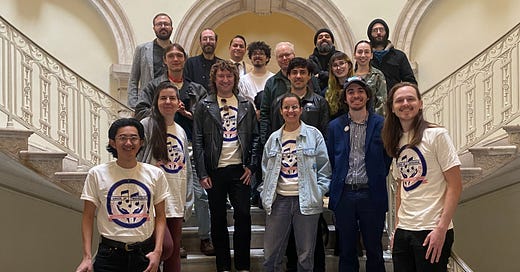My name is Damon Krukowski, I am a native New Yorker and I have been a working musician since the late 1980s, recording and performing first in the indie rock band Galaxie 500, then in the duo Damon & Naomi.
My mother, now 94, is also a native New Yorker and also a professional musician – jazz singer Nancy Harrow. She has been recording and performing since the early 1960s.
I grew up with my mother and her musician friends trading stories about the music business, and the difficulties of making a life as a professional musician. I am under no illusions about how hard that has always been – music, like all the arts, is work without the security of predictable income. That comes with the territory.
However, there has been a profound change in the last twenty years for recording musicians that has made everything harder than before. Ever since streaming technology entered the marketplace, our incomes have plummeted.
Streaming is now responsible for 84% of all revenue from recorded music in the United States. However, unlike previous technologies for sharing recorded music, streaming is unregulated and pays recording musicians nothing directly. Nothing. This has wreaked havoc in the lives of working musicians who, like me, not to mention my mother, started our careers in a different paradigm. But what is even harder to accept is that streaming is making it nearly impossible for younger recording musicians to build a career as professionals.
This is not because streaming isn’t making money. Indeed, it is often said that streaming has rescued the music industry for the digital era, because it is now generating billions of dollars. This is true. But none of it – zero – is paid to recording musicians directly. All the money in streaming goes to technology platforms - Spotify, Amazon, Apple, Google and the Chinese company Tencent control 96% of streaming globally. The technology platforms in turn share that income with a handful of distributors and with record labels, primarily the three major labels – Universal, Warner, and Sony. These corporations, some of them among the largest in the world, are earning billions from streaming.
Meanwhile, nearly all musicians who make the recorded music content for streaming are working multiple jobs, struggling to survive while continuing to create new recordings that have almost no way to reach our listeners but through this same system that doesn’t pay us directly. It has never been harder to survive as a recording musician as a result.
The Living Wage for Musicians Act, introduced last Congress by Rep. Rashida Tlaib of Detroit and Rep. Jamaal Bowman of the Bronx and Westchester, and cosponsored by Rep. Alexandria Ocasio-Cortez of the Bronx and Queens, would right this wrong and for the first time require that some portion of money generated by streaming be paid directly to those who make its content: recording musicians. We aren’t asking for anything that hasn’t been done before for previous technologies of distributing recorded music. But taking action now is urgent for the survival of recording music as a profession.
Thank you for supporting the Living Wage for Musicians Act, and calling on Congress to pass it with New York City Council Resolution 368.
- Damon Krukowski
I presented this testimony at New York City Hall on April 17 2025, alongside a number of my fellow music workers in United Musicians and Allied Workers (UMAW). Paco Cathcart’s impassioned testimony, which closes the video segment from that hearing included here, can also be found in written form at The Cradle’s Instagram.




Share this post